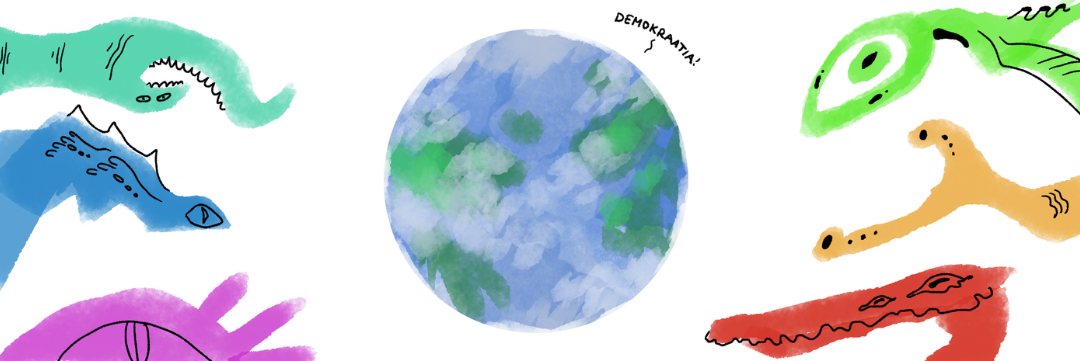
Laura Välik, chief editor of MIHUS
“The alien’s eyes closed, it waggled all its limbs very energetically, and its mouth parts crackled.” This is how science fiction writer Iain M. Banks describes a laughing alien aboard a distant spaceship.
If we were to travel to distant planets today and observe the laughter of inhabitants there, but perhaps their social order instead, we would undoubtedly notice interesting things. This time, MIHUS is dedicated to the topic of local elections and youth initiative. Discussions about democracy and elections, youth and initiative are also discussions about the things that would catch the eye of aliens visiting our planet. About something that creates our world.
Aliens and alien eyes would probably have an important advantage in these discussions.
In the Culture series books, Iain Banks describes a highly developed techno-utopian civilization Culture, where almost no law, head of state or hierarchy exists. Although Culture can be described as an anarchy, it is not a civilization of chaos. In The Player of Games a member of Culture, Jernau Morat Gurgeh, travels to a distant planet in The Azad empire, which enjoys a more modest level of development, in order to play a game, on which the governance of the empire relies. In the description of the Azad empire, our modern civilization can be recognized quite well – seen through Gurgeh`s alien eyes – and exciting parallels can also be drawn with modern Estonian society.
I think that from time to time we all have the ability to acquire alien eyes and observe the phenomena surrounding us as amazing, to perceive how the organisation of something causes alienation or seems illogical. We are a part of this world, but the world itself is so big and we are so small that all different parts of the world probably can’t fit within us. In these miraculous moments, however, the choice arises: to integrate or to rethink, to adapt or to reshape? These are precious moments!
What would our society be like if everyone rethought more at moments when it seems easier to go along, and integrated more at moments when it seems more natural to oppose?
Especially many moments of this kind seem to be given to the newest aliens of our world, ie children and young people, for whom everything is rather new and needs to be given a meaning – an alien, according to the official definition, is also a newcomer. When young people protest against descending into the depths of the environmental crisis at an ever-increasing pace, they are reshaping our current descent oriented mindset. However, in order to understand why dissatisfaction with democracy is greatest among young people, one should perhaps catch one’s own alien eyes in the mirror. After all, we were once aliens too!
The current issue of MIHUS is really important in its time and is worth reading from cover to cover – be they virtual and quite modern. Did Gurgeh beat the locals in their own game? I wouldn’t want to ruin the book experience here, so it will have to remain an exciting secret hidden in the book itself. But this time, I would recommend reading MIHUS with the eyes of a galactic game player – a truly exciting story to share with young people too.
How would an alien describe your laughter?
The cover image was designed by young Estonian artist Margaret Pütsepp.

